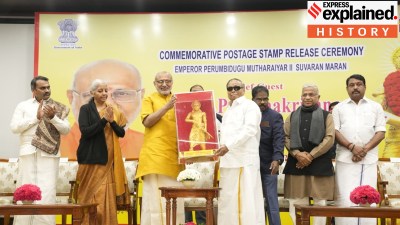📣 For more lifestyle news, click here to join our WhatsApp Channel and also follow us on Instagram
Bigg Boss 12 winner Dipika Kakar recalls her ‘weak point’ on the show: ‘I had panic attacks twice in there’; here’s what can help
"Mentally, you need to be strong to participate in the show. How can you be fake for three months?" added Dipika Kakar
 Dipika Kakar talks about her brief separation from Shoaib Ibrahim at the time of Bigg Boss (Photo: Dipika Kakar/Instagram)
Dipika Kakar talks about her brief separation from Shoaib Ibrahim at the time of Bigg Boss (Photo: Dipika Kakar/Instagram)Bigg Boss 12 winner Dipika Kakar went down memory lane in a recent podcast with Bharti Singh and Harssh Limbachiyaa, where she spoke about the most challenging aspect of participating and eventually winning the show, which aired in 2018. “I was saying no to Bigg Boss for three years. My only issue was that my communication with Shoaib would break down. We had just gotten married. And I had no clue whether I could survive that or not. That was my only weak point,” expressed Kakar, 39.
She added, “I really didn’t bother who said what (to me on the show). So, that journey was really difficult for me. I had panic attacks twice in there. That was a very big challenge for me. It’s a difficult show. Mentally, you need to be strong to participate in the show. How can you be fake for three months?”
 Here’s what you should note (Photo: Freepik)
Here’s what you should note (Photo: Freepik)
Her “weak point” was not a weakness, said Delnna Rrajesh, psychotherapist and life coach, adding that “It was awareness. It showed emotional intelligence – the understanding that connection is not a luxury; it is survival. When the world demands performance, emotional safety becomes the lifeline.”
According to Delnna, the fear of being cut off from their “regulation anchor” is real. “In healthy relationships, a partner becomes a grounding energy. The one person who can calm your chaos, remind you who you are, and hold space when the world becomes too loud. Losing that connection, even temporarily, can feel like being emotionally untethered. It’s not a dependency. It’s biology. Human beings are wired for attachment,” reflected Delnna.
For Dipika, that emotional disconnection inside a high-pressure environment may have triggered anxiety and panic attacks. “Not because she was weak, but because her body was reacting to the absence of emotional safety. The heart can survive distance, but the nervous system struggles with silence. And when there’s constant surveillance, constant judgment, the need for one safe space with the one person to regulate with becomes vital,” said Delnna.
Her story is an example of every person’s story in a hyper-visible world—the professional managing burnout, the creator chasing engagement, the parent juggling expectations. “We are all looking for one thing: a safe connection that reminds us we are more than our performance. When we honour that need to pause, to breathe, to be unseen for a while, we don’t disconnect from life. We return to it, grounded and whole,” said Delnna.
What helps
*Know your anchors. Whether it’s a person, a spiritual practice, or journaling, identify what helps you feel safe when the world feels too loud.
*Regulate before you relate. Don’t express or share when you’re emotionally flooded. Calm first, communicate later.
*Create unseen spaces. Keep parts of your life undocumented—a private joy, a quiet ritual, a space that belongs only to you.
*Detach from validation cycles. Not every moment needs proof. Sometimes, peace is choosing silence over engagement.
*Redefine strength. Real strength is not being unbreakable in public; it’s being emotionally honest.
📣 For more lifestyle news, click here to join our WhatsApp Channel and also follow us on Instagram
- 01
- 02
- 03
- 04
- 05



























